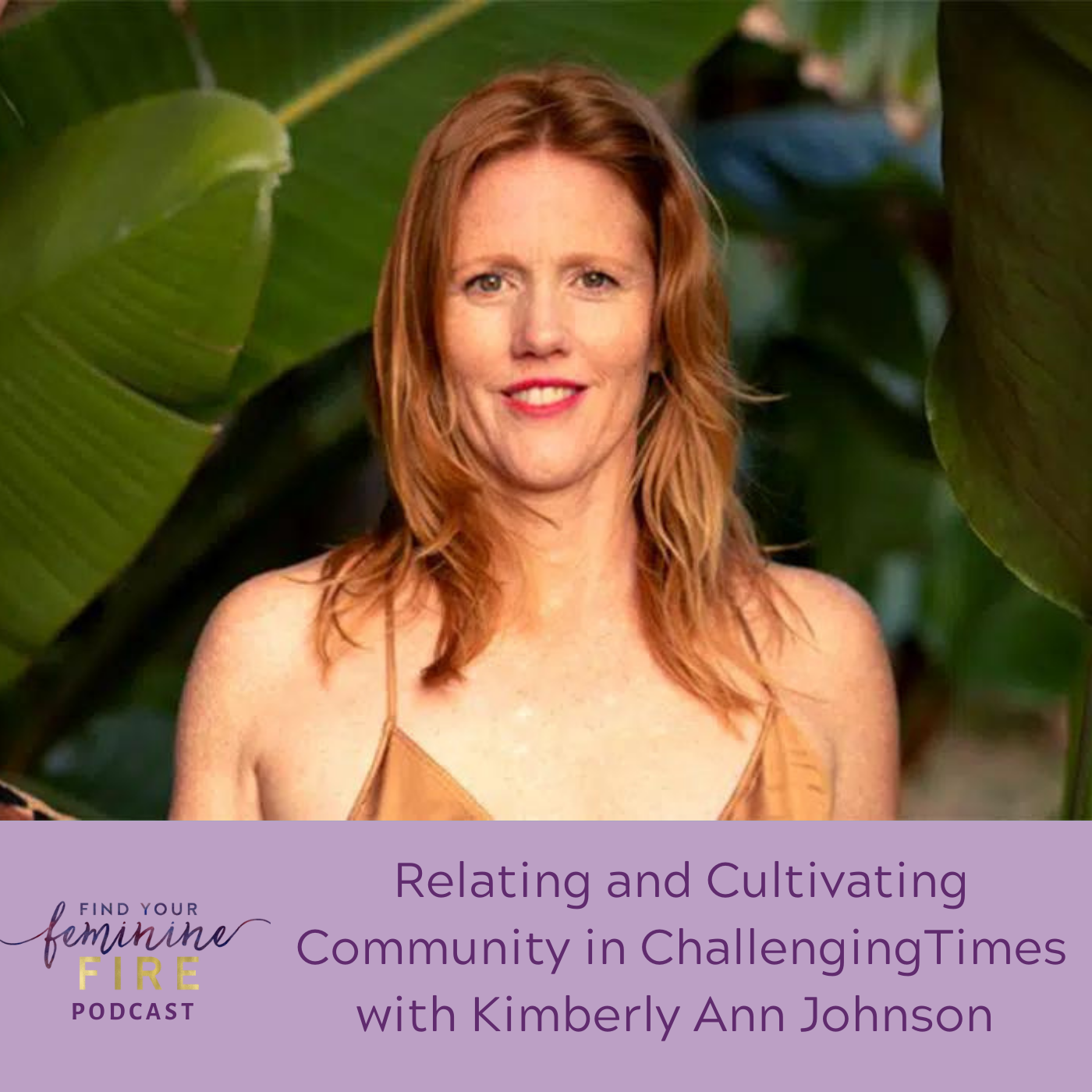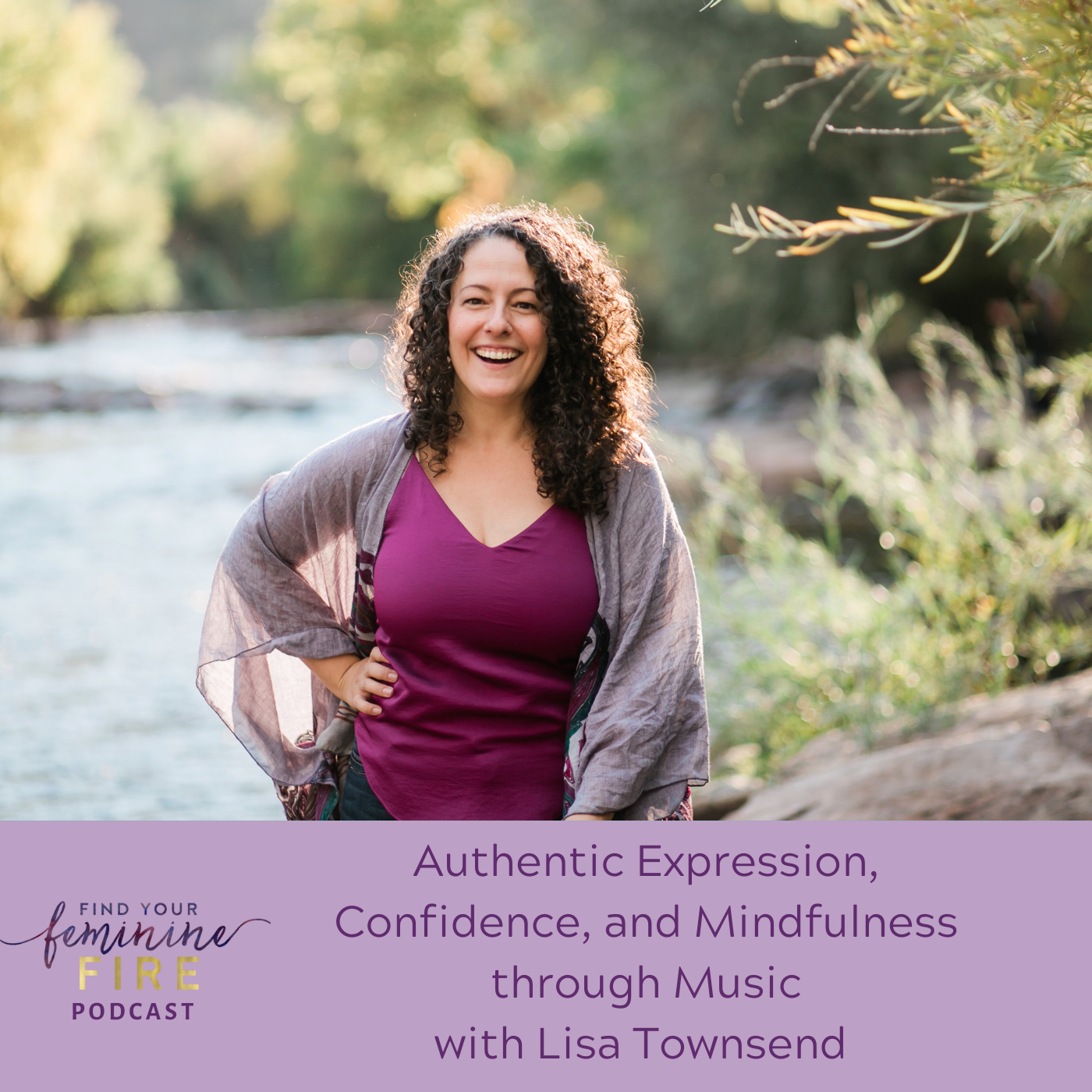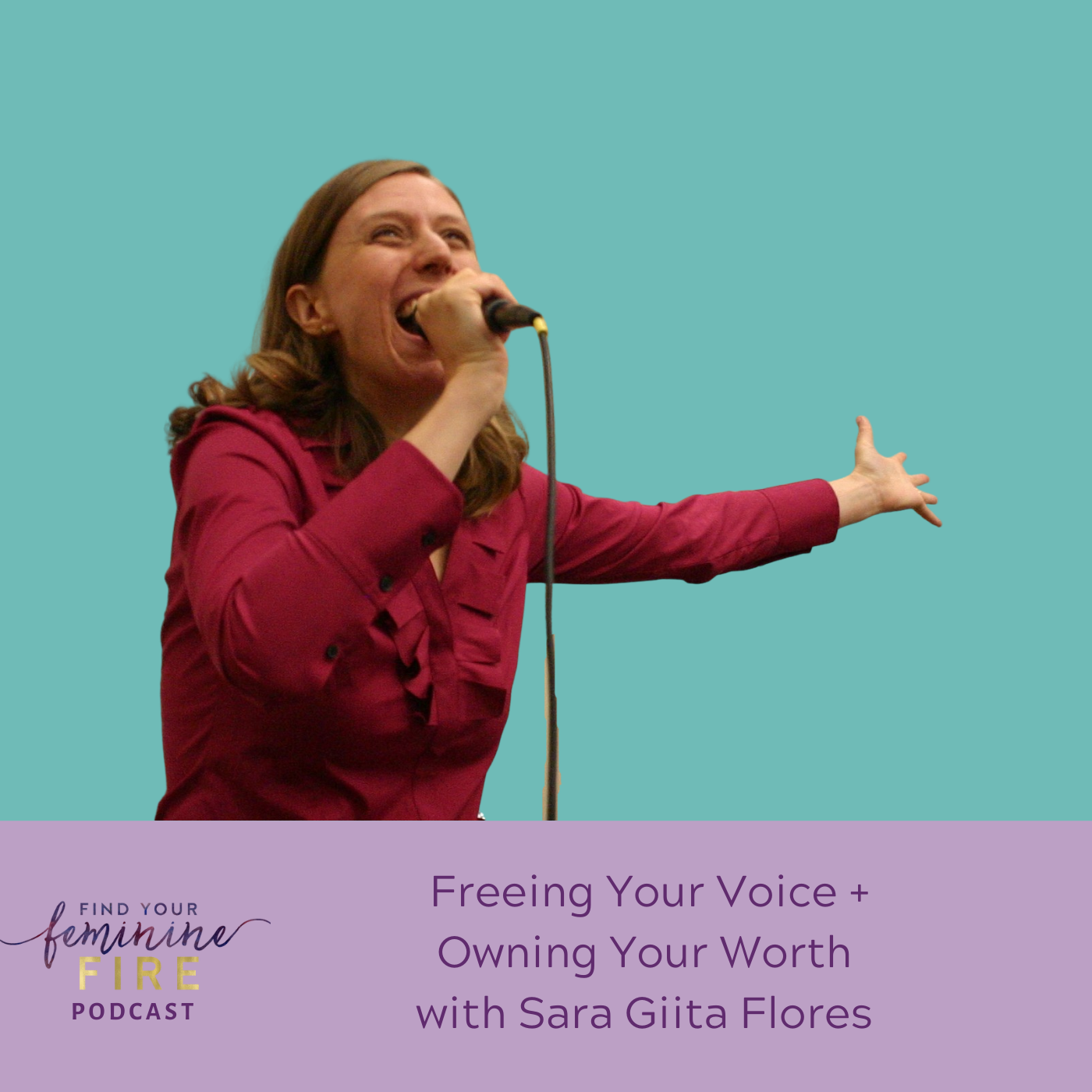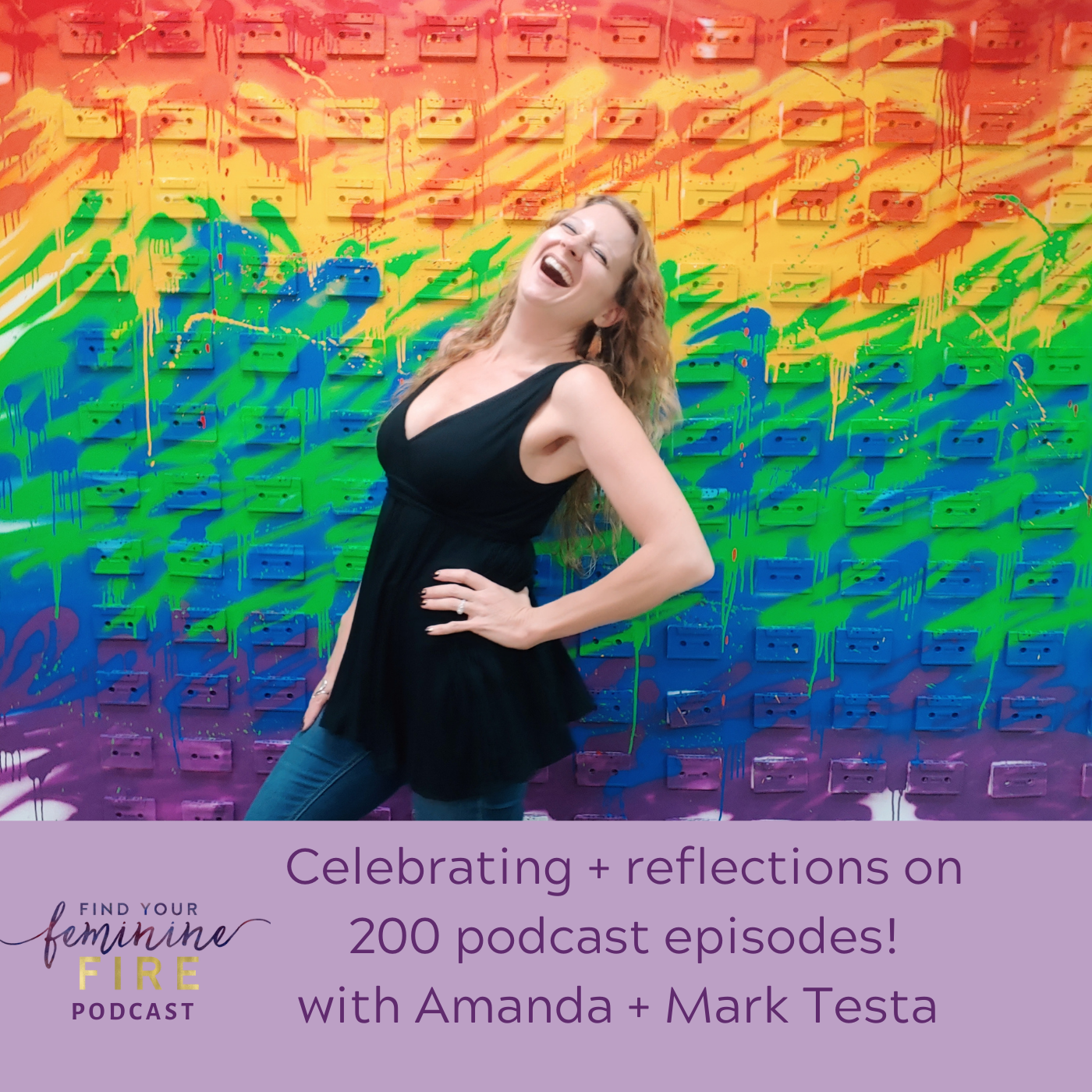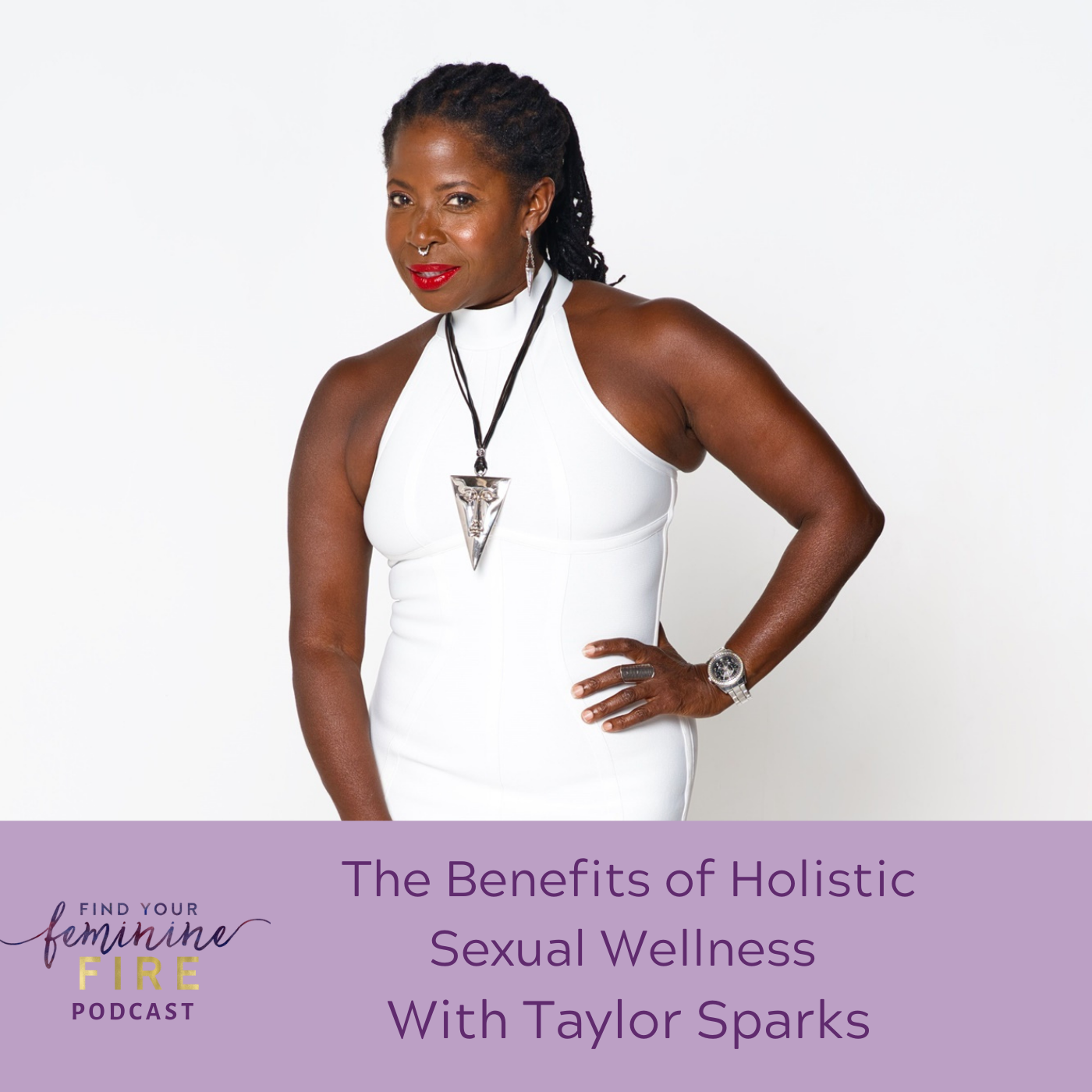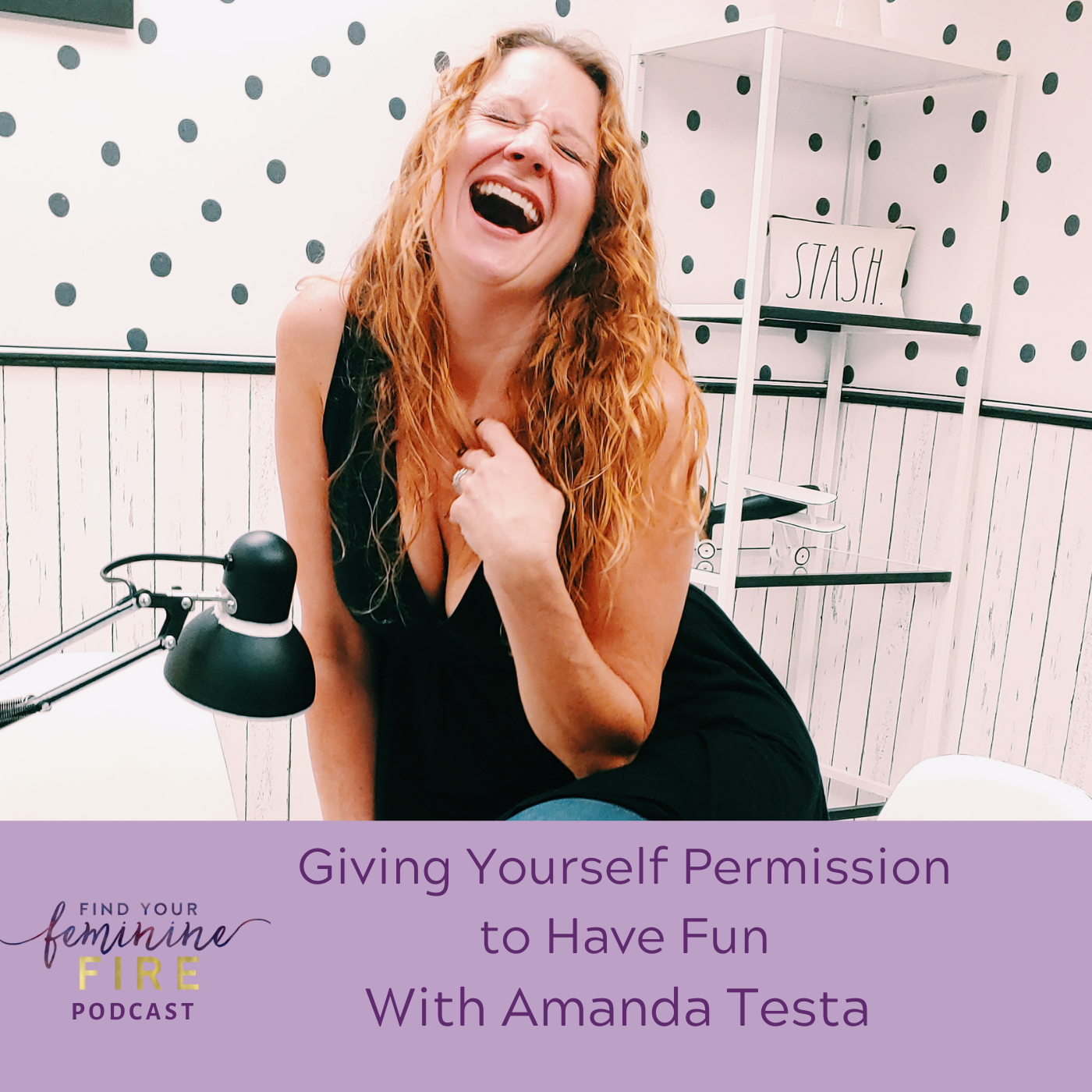Pleasure As nourishment with Amanda Testa
On this week’s pod, I’m going to share with you why pleasure is vital nervous system care. It is not a luxury. It is actually a need for our systems, and some easy ways to invite in more pleasure and to cultivate a sensual self-care practice.
I love sensual self-care and want to teach everyone how to cultivate this practice so you can get your daily dose of pleasure, your daily dose of vitamin P. One of my client refers to me as her erotic fairy godmother, and I really love that term because as Esther Perel says, “Eroticism is the antidote to death.”
The root of the word means force of life. Your Life force.
and yes, it is my mission to help women feel more ALIVE! To feel vitality and radiance in every cell of their being. To know that they are worthy, just by being alive – that they deserve to know their needs, to ask for their needs, and receive their needs at the deepest levels. To THRIVE not just exist in survival mode. To remember who they are, their divine gifts, show up confidently and feel amazing.To have fabulously fulfilling relationships, with themselves and those they love. And yes incredible sex too! To enjoy the full beauty and pain and joy and sadness, embracing fully all the aspects of this gorgeous life we are blessed to live. Enjoy!
Listen below, or tune in via: Apple Podcasts,Stitcher or Spotify.
In this episode you’ll discover
Why pleasure is a vital for our nervous systems and why it’s such a great tool to use.How to rewire our “Negativity Bias”.Why we push pleasure away, and why there is so much wrapped up in that concept that can feel out of reach.What is sensual self care, and how to create a practice of receiving your daily Vitamin P.The science of creating behavioral change.Steps for a sensual self care ritual.Enjoy a mini pleasure practice.and much more!
JOIN IN THE DISCUSSION ON THIS EPISODE AND MORE IN MY FREE FACEBOOK GROUP, FIND YOUR FEMININE FIRE HERE.
Check out the 21 Days Of Sensual Self Care mini Course HERE.
If you are feeling it is HIGH TIME for more pleasure and satisfaction in your life, Schedule a confidential heart to heart connection call with Amanda HERE.

Pleasure and Nourishment: with Amanda Testa
Amanda Testa: Welcome to the podcast today. It is your host, Amanda Testa, and today, we are going to be talking about the power of sensual self-care pleasure as nourishment. I am a sex, love, and relationship coach AKA your erotic fairy godmother, and I am here on this planet to help women remember their own unique magic by awakening their life force through energy, through pleasure.
Today, I’m going to share with you, number one, why pleasure is vital. Self-nourishment, why it is vital nervous system care. It is not a luxury. It is actually a need for our systems. Number two, some easy ways to invite in more pleasure and to cultivate a sensual self-care practice. I love sensual self-care and how to cultivate this practice so you can get your daily dose of pleasure, your daily dose of vitamin P. One of my clients, years ago, referred to be as her erotic fairy godmother, and I really love that term because as Esther Perel says, “Eroticism is the antidote to death.”
0:01:04
I just think that’s so important and powerful, right? Eroticism is way more than sex, too. Of course, sex is one amazing way to enjoy eroticism, but the root of the word means a force of life or life force. I do feel it’s so needed for women to become more alive and to know that just by being, you are enough, you are worthy to be able to know your needs, ask for your needs, and receive your needs, to thrive, right, and to have fabulously fulfilling relationships with yourself and those you love and yes, incredible sex too, [Laughs] to really enjoy all the aspects of this gorgeous life we’re blessed to live. It’s really, truly possible for all of us.
I’m curious when it comes to the word pleasure, what comes up for you because it can be very normal that it brings up a plethora of things, you know? There are layers and nuances to it, and that’s okay, right? However this word lands for you, that is okay because it can be wrapped up in a lot of things, and when I’m talking about pleasure, I’m talking about inviting in more of what feels good in a way that feels doable for you, right?
0:02:07
It’s all about doability and finding a way to nourish yourself that actually feels good to you. Our daily nourishment of our eros, right, our life-force energy. This is what pleasure does. It nourishes our life force, and that’s why it is so key because, really, I love using pleasure as a tool to nourish ourselves and our nervous systems, and with sensual self-care, that’s what you’re doing. It can be so simple. It can be enjoying a cup of tea. It can be meditating for five minutes. It can be hugging a loved one. Yes, it can be multi-orgasms. It can be a very large variety of things. So when I’m inviting you into cultivating this practice, it’s finding a way to do it that’s actually realistic, that’s actually nourishing, and I’m gonna talk about how to do that more.
I want to just briefly talk about why pleasure is a vital for our nervous systems and why it’s such a great tool to use.
0:03:03
Really, our nervous system is so intertwined with our experience of sex, with everything, really, right? It’s a huge part of who we are, and I’d like to talk with you a little bit about a concept called wur window of tolerance or range of resilience, as Brigit Viksnins says. Window of tolerance is a term from Dan Siegel, and, really, what that means and why — I’ll briefly explain this ‘cause if you’ve been listening to the podcast for a while you might have heard this before but I just briefly want to talk about it because, really, what we’re trying to do is build a strong foundation.
If you think about a big, 200-year-old oak tree that’s huge and wide and it’s got roots that are so deep and it can weather all the hurricanes, right, versus a small, little sapling that the big gust of wind is gonna just knock it right over and send it flying down the road. This is what we want to do for ourselves, for our nervous systems. We want to cultivate the capacity for depth, for strength, for holding, for being, and have this really strong foundation so that when the winds of life blow through, as they will, that we can easily come back to a place of resilience, to a place of calm.
0:04:14
It’s normal that we’re gonna be anxious sometimes. It’s normal that we’re gonna be sad sometimes. It’s normal that we’re gonna feel all the feels, but when we have a healthy range of resilience, when we have a healthy window of tolerance, we’re more likely to be able to come back to a place of feeling good more quickly, right? And so, really, one of the definitions of trauma is too much, too fast, too soon, and that can be something good, too, right? So we want to increase our window for pleasure and also increase the capacity for arousal so we can hold more of what’s good. Oftentimes, we just have to build that ability to hold what’s good.
I like how Gay Hendricks refers to this as, like, an upper-limit problem sometimes, right?
0:04:59
So you get to a point where if things are going really good, you might do something to kind of self-sabotage that in a way, and sometimes it’s just life that happens, right? But knowing that the more we can expand our capacity to hold arousal energy, the more we can enjoy what’s good, the more we can handle stress, the more we can be resilient in times of challenge. And so, that’s how pleasure helps our nervous system. We can actually rewire our brains to feel more pleasure to default to pleasure. This is really important as humans because we have what is called a negativity bias.
A negativity bias is our tendency, not only, to register negative stimuli more readily but also to dwell on these events, and this is an evolutionary gift that we now still hold because it came to being so that we avoided things that could kill us, but it doesn’t always necessarily serve us today. So this is why, when we work to default to pleasure, it becomes easier for us to do so. The good news is that our brains are able to be rewired to feel more pleasure.
0:06:02
The more we engage in pleasurable experiences, the easier it is to receive as well, and this is why we do the tool. This is why creating a rhythm of sensual self-care is important, so that when the arousal happens, when the stress happens, when the pleasure happens, when the goodness happens, our system is strong enough to contain that and run that energy through our systems without shutting down.
So, as I mentioned before, when we’re talking about the window of tolerance, when we’re in that range, we easily bounce back and forth between arousal and hypo-arousal, but we’re able to come back to a range of feeling good pretty quickly. When we are living in a lot of stress, like, stress, stress, go, go, do, do, never having a minute to sit, never have a minute to rest, always rushing, always onto the next thing, we can get into this real high anxious state, right, where we’re stressed and anxious all the time. The littlest things set us off. You know, you drop your keys and it’s a plethora of exploitatives out of your mouth and screaming at your kids and all the things. This is anxiety, right?
0:07:00
When you feel this anxiousness, we can get sometimes stuck up here in this hyper state, though, then we can just burn ourselves right out instead of dropping into the window of tolerance, we’re going all the way down into a hypo-arousal state, one of depression or just like ugh, I can’t even go on or you might get sick or all the things that could happen, but just feeling ugh, I’m just too exhausted, I can’t even put one foot in front of the other, but oh, I’ve got to pay bills, so then you’re ah, I’ve gotta go back in and you’re back in that stress state, right?
So the key is nourishing our bodies, nourishing our systems so that we can stay in the range of resilience, so that we can come back to a place of feeling regulated, feeling that we can handle what’s coming across our plate, feeling like we have the capacity to hold the good, the bad, all the things. So this is why I love pleasure. You know, it’s about creating rhythms that feel good to you because we are cyclical creatures, right? We can be in different seasons of our lives.
0:08:01
We can be in different seasons of our months. We can be in maybe a very fertile, maybe a summertime, maybe a very joyous time of our life, right? Maybe we might be in a more withdrawn phase. Maybe it’s more of a wintery, slow phase. Maybe things are dormant, and that’s okay too.
So it’s honoring where you are and showing up to celebrate yourself in that way. That is the beauty of the sensual self-care practice is you show up with your intention to honor yourself, to give yourself what you need, to tune in because, so often, we don’t listen to our body’s cues. We override them, and that is partly our culture, right, partly our conditioning, partly that we don’t trust our own body’s wisdom sometimes. And so, this is the beauty of cultivating a sensual self-care practice. You can tune into yourself. You can find what is the pleasure for the season of the life that I am in right now? What is the pleasure I need in this moment today? What is my need right now?
0:09:00
I’m curious if you were to even ponder that question for yourself. What is it that you need right now in this instant? What do you need? If you knew that your needs mattered, what do you need, and is it possible to offer it to yourself in some small way, right? Maybe you feel lonely. Maybe you need connection, so what about — if even just for right now, you wrap your arms around yourself, you bring to your mind’s eye a picture of someone that you love or that you would love to spend time with or a memory of a time where you felt very connected, and just allow that experience to flood your system with goodness in a way that feels doable. You’re listening to what you need, and you’re offering that to yourself in some small way, and then how does it feel to really receive that? How does it feel to let that in? Maybe it feels easy. Maybe it feels challenging, and that’s okay. Just honoring where you are, and that can be the simplicity of a sensual self-care practice.
0:10:06
So often, though, we push pleasure away, and I do believe pleasure is not a luxury; I believe it is a need. So why do we push it away? Well, number one, we might not trust pleasure, right? As I mentioned earlier, too much, too fast, too soon. Maybe it’s been an experience where it wasn’t always great. So we have to find ways of engaging with what feels good in a way that feels doable for us, not overwhelming ourselves, right? So many times I talk to women who are afraid of surrender, right? The surrender that comes with pleasure. Letting go, letting go, letting go of the outcome, letting go of what you might have to do next, letting go of the grocery list in your head. Letting go can be such a challenging thing, right? Perhaps, you feel it’s a waste of time. Perhaps, you feel it’s frivolous. Perhaps, you feel it’s a luxury, and granted, yes, a privilege it can be to be able to have the time and space, but also it doesn’t have to involve a lot of time and space, right?
0:11:04
It can be as simple as taking three breaths. It can be as simple as going to the bathroom and actually giving yourself five minutes to breathe and to just relax.
So, oftentimes, we do, though. There’s a lot of shame and guilt around pleasure, right? We have these ideals in our culture of extraction and productivity and just, like, giving, giving, giving constantly, and also, for women it can be very in our nature to give, and we love giving, and we love helping others and offering our love and support, but also, we need to receive it as well, right? As I said before, when we are able to allow pleasure in, when we’re able to allow that self-trust to surrender into what feels good, it can increase your window of tolerance, it can increase your resilience, and we experience pleasure — we all experience it differently, right, as a result of our individual differences and biology or neurokinestry, past experiences, cultural factors, all the things, but we can allow it to nourish ourselves in a way that feels good for us. So this is part of the beautiful sensual self-care practice, is creating a way it feels good for you.
0:12:09
So what is sensual self-care? What does a sensual self-care practice look like? Sensual self-care is a daily ritual to feel radiant, to feel sexy, to feel energized, to ignite that feminine fire within us, creating a ritual of this daily connection to yourself and honoring where you are in the moment, honoring whatever’s alive in you, and accepting it. Granted, it’s easier said than done, but that’s why it’s a practice. That’s why you show up again and again. What I love about rituals is that they speak to the most primal part of our brain, right? The primal brain speaks in symbols and sensations, so when you create a ritual, you’re adding a lot of language for the primal brain to speak with in a way, so it brings it more online. It’s also an outward manifestation of a conscious intent. When we place our intention into any action, the power of that act is magnified, right? When we get all of ourselves on board, our brain, our subconscious, all the pieces and parts of us, we’re more likely to get to our goal.
0:13:05
Our brain loves ease. It likes easy things, right? This is, often, what I work deeper with in my clients because sometimes there are deeper pieces and resistance that need more deep work, you know, more deeper traumas that need integration, and more healing is required so that you can feel really safe and deserving and worthy of receiving your goals, worthy of receiving pleasure.
And so, the beauty of setting up our ritual for sensual self-care is you only need a few minutes a day, right? Number one is you need to set up your space for pleasure. Really setting up an environment that feels good to you. This could be as simple as clearing off a bedside table and having a candle there, right? It could be as extravagant as having, maybe, an extra space in your home where you really set it up for pleasure. You have beautiful things that make your whole body smile, right? Colors you love, textures you love, decorate it in a way that feels really cozy and yummy.
0:14:00
That can be one of the ways you can go about this, right? Or it can just be, like I said, having some little spot, maybe a box that you put some items in that connect you to yourself that maybe connect you to some intentions you have, maybe have a little altar-y setup with things that you love that make you feel good, and you visit that, but setting up that space is kind of giving your brain an opportunity to connect that this is something special going on here, okay? Maybe even clearing your space. That’s actually a beautiful part of the process is you clear a little space because, not only are you energetically clearing the space, you are physically cleaning the space so that you can really have room to drop in and honor yourself in whatever way feels doable.
Then, you just drop in and enjoy whatever it is, right? The second thing is just dropping in, and knowing that, you know, when it comes to creating behaviors, when it comes to creating habits that stick — I love the book Tiny Habits from BJ Fogg, and he talks about the three keys to creating rituals that stick.
0:15:03
Number one is the reminder, right? There is a trigger that happens. It’s easier to remember to do something after something else. So think of things that you do regularly that you could use for the trigger. Like, I love the ritual space ‘cause I know when I go in there, that triggers my mind okay, we’re gonna do something special here. I like to just clean off my bedside table, and light a candle, and that’s, for me, just so easy and doable ‘cause I’m already doing that in the space, right? So another could be, for example, after I open my eyes in the morning, I will drink a glass of water that’s next to my bed. After I brush my teeth, I will look at myself in the mirror and give myself a complement. After I open my computer, I will take three deep breaths. before I go to bed at night, I’m gonna place my hand over my pussy and tell it I love it, right? I’m going to offer my body some nourishment in some small way. Whatever it is, right?
The second thing is the doing, the ritual, actually doing of the habit, the action of doing the thing. Making it short and sweet makes it doable, so as you get started, I like to invite in simple things, right?
0:16:02
Maybe you have a journal next to your bed, and you write down your pleasurable things from the day. I love a pleasure journal because, again, the more we default to pleasure, the more it’s easier for our brain to see what’s pleasurable around us, the more we’re able to drop in. When it comes to having great sex, feeling connected, it’s not just about one aspect of our life; it’s about all of the aspects in our lives, and the better we feel overall, the more we feel connected to our desires, the more we feel turned on by what’s good in our life, the easier it is to open up to feeling turned on in more ways, right? So number two: doing the habit.
Number three: reward. You will add a little celebration into whatever you’re doing, right? So, perhaps, you finish your ritual, you blow out the candle, and you’re like yay, I did it, right? Maybe you pat yourself on the back. Maybe you give yourself a little shimmy. Whatever it is that helps you feel good for what you’ve done. BJ Fogg names that term “shine,” and it’s really that feeling of pride you get after doing something good for yourself, and the more you can connect to that feeling, the more likely you’re able to do the action again.
0:17:04
Those are the three keys, right? I love setting the ritual space because that’s my trigger. Maybe there’s something else that can be your trigger to do the ritual. Number two, actually doing the thing, and number three, celebrating, giving yourself a little bit of a reward.
What are some ways that you can enjoy a pleasure practice, you might be asking. So I love creating a pleasure practice in numerous ways, and even right now, I’m gonna invite you into joining me for a quick little few-minute pleasure practice. Again, if you’re driving or whatnot, you can just engage in this practice whatever way is doable and safe for you right now.
So what I love to do is, again, creating my little ritual space. So, for you, right now, you might not have had that put together and done, so just in your mind’s eye, maybe if you want to close your eyes. If you’re driving, you can listen to this another time or just listen and mentally note what I’m saying.
0:18:00
Maybe visualize a space around you that is beautiful and clean. If you could create the ultimate pleasure palace spot for yourself, what might it look like? What are some elements of that you would love to see around you or smell or taste or hear? Maybe you have some gentle music playing. Maybe you have some warm blankets or a fan if you’re hot. Maybe you have a candle. Maybe you have some essential oils. All these little things. You know, whatever it is that makes your experience just a smidge more pleasurable, right, just a little bit more pleasurable. And then, I like to have an intention. So, perhaps, for this few-minute practice, just think what your intention might be.
So, for me, my intention is going to be just to connect to what feels good in this moment in my body, in whatever way I can, and celebrate the heck out of it.
0:18:59
So I love to start with just really taking my hands and infusing that intention into my hands, just touching my hands, rubbing them back and forth, noticing how it feels to gently touch the tips of my fingertips together, just noticing the sensations there, rubbing my fingers on my hands, and just noticing what does it feel like to touch my skin? What does it feel like to be touched? Also, really, infusing my hands with love, with acceptance, with kindness, with honoring, and just really noticing how that feels. Noticing your hands and all that they’re capable of. Maybe just taking a moment to honor all that you’ve created with your hands in your lifetime. What a magnificent gift.
As you, perhaps, touch your fingers together, maybe you want to invite in a little gentle touch to your face, mabe noticing how it feels to gently stroke your cheeks, maybe your lips, maybe your hair.
0:20:16
Maybe giving yourself a gentle little massage on your head. Maybe inviting in a little supportive hold. One that I love is placing one hand on your forehead — one hand cupping your forehead, and one hand on the back of your neck, and just holding your head in between your hands, just noticing if there’s any pleasure you can connect to in that, any pleasure of feeling supported. Even by your own two hands feeling that. [Deep breath out] Perhaps, taking a deep breath. [Deep breath out] Adding in an audible sigh when I breathe if I need to.
0:21:00
[Audible sigh] Just taking a few moments here, and noticing where might your body want to be touched, how might you want to offer some touch to yourself, and really celebrating where it feels good.
Noticing, as you connect to something that feels good, how might it feel to just hold that for a couple seconds? Does it feel okay to just notice can I hold that for one moment more than I normally would? Maybe one millisecond more than I normally would. Also, really, just honoring the state of your body, the state of your being in this very moment. It’s okay to be exactly as you are. You matter. Your needs matter. You are here. You are now. You matter, and you’re enough just as you are in this moment. Maybe even just placing your hands on your heart if that feels good or maybe just bringing your awareness to your heart and taking three breaths here. Honoring yourself for doing this little practice. Honoring yourself for being open to connect to what feels good. Perhaps, noticing if you feel any different in your body, in your being now, than you did a few minutes ago. Just being curious, and when you’re reading, you can bring your awareness back to your space, stretch and give a little celebration. Yeah, I did it! A little shimmy, maybe, whatever feels good. I love a shimmy. I love to shimmy my chest AKA Betty White.
0:23:01
[Laughs] It’s so fun for me. Ah, so there you go. That can be your ritual for today, and if this is something that you are interested in learning more about or you want to dive into more sensual self-care, I invite you to reach out. I also have a beautiful 21-Day Sensual Self-Care mini-course that you can get at www.amandatesta.com/21days and it’s really just a daily practice that’s ten minutes or less to connect you to your sensual self, and I really feel like cultivating this habit can be a little challenging at first, but it’s so worthwhile in the end because the more that you can default to what feels good in your system, the easier it is to find the good and to find the resilience needed to take action for what’s important to you, right, and to show up the way you want to for your family, for your partner, for your kids, for your community, for the world, right?
0:24:01
I do believe that this vitamin P, your daily vitamin P, will help to increase your energy, increase your life force, and I am happy to help you if you feel you need extra support in that way because, truly, our nervous system is such a huge foundation for what we need, what we want to bring into this life and having the capacity to do it in a way that is actually gonna feel good, in a way that you can maintain and build on whatever you’re creating without burning out, the way you can show up again and again when things get hard, when things get challenging in your family, in your relationship, whatever that may be, in life.
Thank you so much for listening. I’m sending you all so much love. I just want you to feel in every cell of your being, the love that you are, the love that’s available to you. Ah, I just am so grateful for each and every one of you.
0:24:58
Thank you for listening, and I will see you next week.

